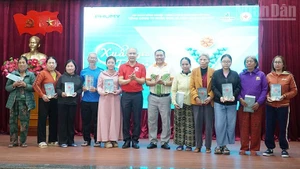The solutions include completing policy and legal regulations regarding socio-economic management and anti-corruption, perfecting the organisation of the state apparatus as well as the public service regime, building a contingent of officials, civil servants and public employees with integrity, and improving law enforcement efficiency.
The resolution underlined the need to strengthen supervision, monitoring, inspection, audit, investigation, prosecution, judgment and execution activities, along with the enhancement of public awareness and sense of responsibility of society in prevention and control of corruption and negative phenomena.
It also pointed to the necessity to enhance the efficiency of international cooperation in anti-corruption as well as the full implementation of national rights and obligation as a signatory of the UN Convention against Corruption.
Particularly, the resolution underscored the need to review and streamline the State administrative system at all levels, and the strengthening of decentralisation with specific, clear and scientific regulations on functions, tasks and authority of each management level, ensuring transparency and high responsibility, together with an effective mechanism of inspection, examination and supervision.
According to the resolution, over the past years, under the leadership of the Party and with the joint efforts of the whole people and military, the country has gained important achievements in socio-economic development, with strengthened defence and security.
The Party and State have issued many policies and laws regarding corruption and negative phenomena prevention and control, resulting in many important outcomes in the field, receiving support and recognition from the people and international community.
However, corruption and negative phenomena have still happened complicatedly in many areas, especially in the fields of personnel and organisation; finance, budget, public asset and State capital management at businesses, construction, bidding and auction activities; land, natural
resources, minerals management; credit, banking; tax, customs and law enforcement activities directly related to people and businesses, it said.
Corruption and negative phenomena have still been one of the threats to the survival of the Party and the regime, it said, pointing out major reasons behind the situation, including problems in State management and limited engagement of the society in the work.
Therefore, the Government’s issuance of the resolution aims to inherit achievements in anti-corruption and enhance the efficiency of corruption and negative phenomena prevention and control activities in the coming time.
















